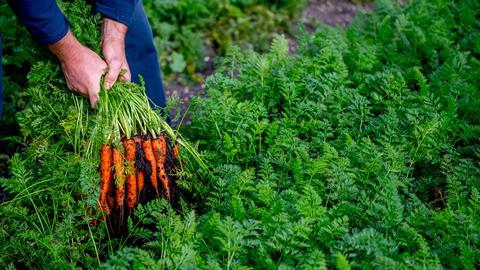Stand by net zero and support environmental innovation, urges Tesco boss as supermarket unveils rapid expansion of low-carbon fertiliser trial
Tesco CEO Ken Murphy has called on political parties to stand by their net zero commitments and give businesses the confidence to invest.
The call to action came as he unveiled the rapid expansion of one of Tesco’s key agricultural innovation initiatives, the largest commercial field trial of low-carbon fertilisers in the UK.
Speaking at the Reuters IMPACT event in London, Murphy said green innovation in the food industry could be transformational in helping to cut costs and carbon, protect food security, and stimulate green growth.
But he warned that levels of investment in the UK remain well below the OECD average and that government and industry must work together to enable and unlock large-scale innovation.
Murphy announced that Tesco will expand its trial of low-carbon, mostly domestically produced fertilisers, in a bid to drive a tenfold increase in the number of hectares being cultivated by low-carbon alternatives for the 2024 growing season.
The retailer has committed to share the findings so other businesses can also learn and benefit.
With conventional fertiliser costs rising by as much as 140 per cent last year, and the closure of the UK’s last remaining fertiliser plant, low-carbon fertilisers could be a cost-effective and less volatile alternative for farmers struggling with shortages caused by the war in Ukraine.
During the first year of the trial, 1,300 hectares of land were cultivated using eight different low-carbon fertilisers, six of which were manufactured in the UK from material including food waste, chicken litter, fire extinguisher waste and algae.
This land produced 70,000 tonnes of fresh produce, according to Tesco, including lettuces, carrots and potatoes.
Initial results found the low-carbon fertilisers were just as effective as conventional inputs and cut emissions by up to 50 per cent.
Now Tesco plans to expand the trial to 13,000 hectares next year, paving the way for widespread take-up of low-carbon alternatives.
As well as its main vegetable suppliers, Tesco also plans to roll out the initiative to more of its Sustainable Farming Groups, many of whom manage pasture and forage-based systems for rearing livestock.
Murphy emphasised his desire to build “a more resilient, sustainable and productive food system”.
“Innovations like low-carbon fertiliser are part of the solution,” he said. “As the early results show, they have huge potential to cut greenhouse gas emissions, enhance soil health and water quality, as well as providing greater cost certainty for farmers and create industry here in the UK – which is why I am so pleased with our plans to scale up usage next year. But to realise the full benefits, we need to see action beyond our supply chain, too.
“We’ll only get there through cross-industry and cross-party collaboration. We all need to drive towards the same goal and be better at sharing learnings and resources on the way.
“The food industry is willing to invest but needs more stability and confidence when it comes to future policy. That is why it’s critical that all parties, regardless of political creed, stand by their net-zero commitments and timelines.”
The initiative will contribute to Tesco’s wider target, under the WWF Basket initiative, to halve the environmental impact of the average shopping basket by 2030.
The retailer added that reducing on-farm emissions is a key part of its ambition to reach net zero across its supply chain by 2050.




